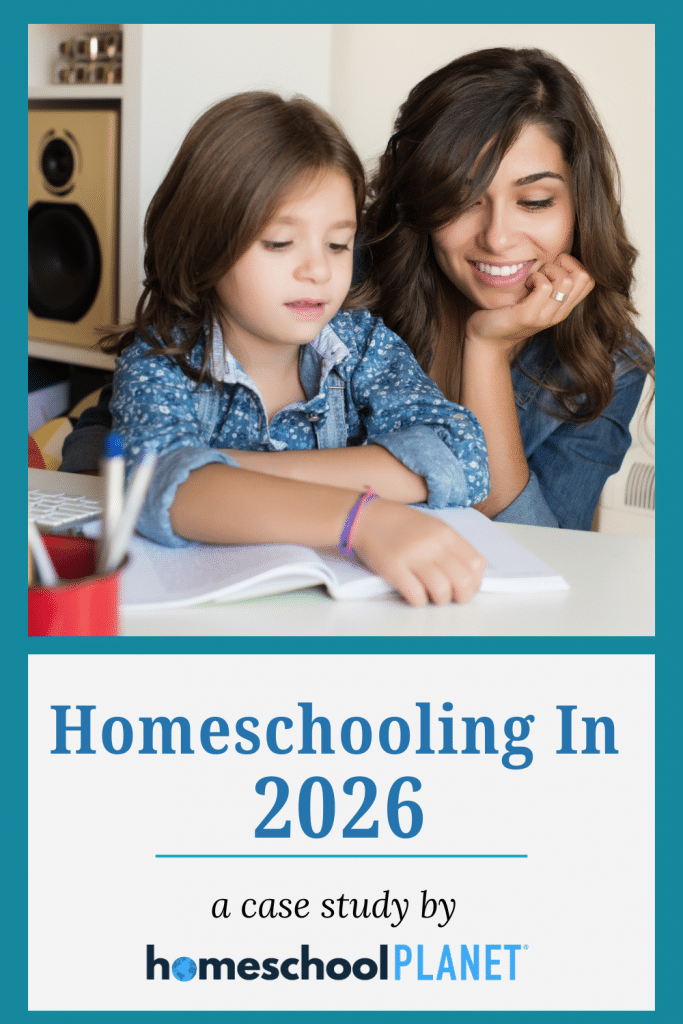Homeschooling in 2026 Trends: A Case Study
This in-depth look at homeschooling in 2026 provides a summary of the most current homeschool data as well as homeschooling trends for the future.
Homeschool Planet’s commitment to evolving technological support and the best possible resources for homeschool families is among the best in the industry, both for this year and well into the foreseeable future.

Homeschooling has changed so much over the years!
Because we are homeschoolers ourselves, we can personally attest to how different the world of homeschooling is now vs. when our oldest children first began learning.
In an effort to make sure that we are bring you the very best possible support and resources, we’ve curated a case study all about homeschooling today.
Introduction: Homeschooling In 2026
If you have made the decision to homeschool your children, you are certainly not alone!
Over the past few years, more and more families have made the decision to homeschool, influenced by the rise in online learning, changing cultural/social needs, and the ongoing public discourse about traditional vs. alternative education. The trend of homeschooling, which saw significant growth during the COVID-19 pandemic, has persisted as a viable educational option for many families.
Our case study explores the current landscape of homeschooling, examining the reasons behind its increasing popularity, the tools and methods that fuel the educational experience of homeschoolers, and the future outlook for homeschooling in the United States.
Background: The Rise of Homeschooling
Homeschooling in the U.S. saw a sharp increase during the COVID-19 pandemic, as families sought alternatives to traditional in-person education amid health concerns and school closures. Although there was a decline in homeschooling rates post-pandemic, the number of families choosing to homeschool has remained higher than pre-pandemic levels.
According to the U.S. Census Bureau, in 2021, nearly 11% of households reported homeschooling their children, up from 3% before the pandemic. By 2024, this trend has solidified, with homeschooling now being a consistent choice for families of all political and social backgrounds.
How Many Children Are Homeschooled in the United States?
As of 2024, approximately 4 million children in the United States are being homeschooled. This figure represents about 10% of the total student population, which has remained relatively stable since the significant spike in homeschooling rates during the COVID-19 pandemic. This is a significant increase from pre-pandemic levels, which were around 3-4%.
Reasons for Choosing To Homeschool
The decision to homeschool is a deeply personal one for most families. However, there are some key reasons that drive the increases we are experiencing in homeschooling.
- Educational Flexibility: Parents appreciate the ability to tailor the curriculum to the unique learning needs and interests of their children. For instance, a child who excels in math but struggles with reading can receive more focused attention in their areas of difficulty without being held back or left behind.
- Customization and Individualized Learning: With access to a variety of educational resources, from online courses to specialized tutoring, families are able to create personalized learning experiences. This is particularly beneficial for children with special needs or those who are gifted.
- Dissatisfaction with Traditional Schools: Many parents continue to choose homeschooling as a way to avoid perceived flaws in the traditional public and private school systems, such as concerns over curriculum, school safety, or socialization issues.
- Health and Safety Concerns: Ongoing health concerns—whether related to COVID-19, mental health, or other factors—have led some families to keep children home. Homeschooling allows for greater control over health protocols and mental health support.
- Cultural and Religious Reasons: Some families choose homeschooling to incorporate their cultural or religious values into their children’s education, ensuring that the content aligns with their beliefs.
- Technology and Online Resources: The proliferation of online platforms, digital tools, and virtual learning environments has made homeschooling much more accessible than ever before. Programs such as Khan Academy, ReadyMade School and other online, all in one homeschooling options allow parents to engage their children in diverse and high-quality learning experiences.
Homeschooling Methods and Approaches
In 2026, homeschooling methods are highly diverse. Many homeschool families use a blend of traditional and modern approaches, influenced by available technology, educational philosophies, and personal preferences. Here are some of the most common methods employed by homeschoolers:
- Classical Education: The classical education method emphasizes a rigorous, traditional curriculum focused on the “Trivium” (grammar, logic, and rhetoric) and a deep study of classical works in literature, history, and philosophy. It is often used by families who value a time-tested educational model rooted in intellectual development.
- Montessori Method: Inspired by Maria Montessori’s educational philosophy, the Montessori homeschool method focuses on self-directed learning, hands-on activities, and fostering independence in children. It encourages children to explore subjects at their own pace, with learning environments that emphasize creativity and experiential learning.
- Traditional/Textbook Method: The traditional homeschool method is similar to a public or private school in that most curriculum comes pre-packaged with textbooks and lesson plans. This method is best for students who need structure and prefer working on individual lessons and assignments at their own pace.
- Unschooling: Unschooling is a child-led approach where learning is driven by the child’s natural interests rather than a fixed curriculum. Parents who follow this method tend to encourage exploration and discovery rather than structured lessons. This approach places heavy emphasis on experiential learning, such as field trips, life skills, and self-discovery.
- Charlotte Mason: This method is named after Charlotte Mason, who is known as the originator of the homeschooling movement. Using this method, children should primarily learn through observations of nature, poetry memorization, journal writing, classical music appreciation, and recitation of scripture or poetry during a time often referred to as Circle Time or Morning Time. The goal is for the educational process not only to include content but also to cultivate good character along with academic knowledge and strength in faith if desired.
- Eclectic Homeschool Method: The Eclectic Homeschooling method is a combination of several techniques. Innovative parents rely on their own judgment to select topics that make up the curriculum for their own children. These parents are always looking for the best products they can find to help them meet the needs of their homeschoolers.
- Hybrid Homeschooling: Many families adopt hybrid homeschooling, where children attend traditional school for certain subjects or activities, while other aspects of their education are completed at home. This method provides flexibility while maintaining access to some traditional school benefits.
- Online Homeschool Programs: Fully online programs, such as those offered by virtual charter schools, provide complete curriculums that students can follow from home. These programs typically offer a mix of live online classes and self-paced assignments, supported by digital learning tools and resources.
The Potential Challenges of Homeschooling in 2026
Despite its many advantages, homeschooling may present some challenges for homeschool families:
- Time and Effort: Homeschooling requires significant time and commitment from parents, especially if they are the primary teachers. This can be particularly challenging for parents who work full-time or have multiple children at different learning levels.
- Socialization Concerns: One of the most common criticisms of homeschooling is that it may limit children’s opportunities to interact with peers. While co-ops, sports teams, and extracurricular activities help address this, it remains a concern for some families.
- Financial Burden: Homeschooling can be expensive, particularly when factoring in the cost of curricula, educational materials, extracurricular activities, and online programs. Many families must invest in educational resources that would otherwise be provided by public or private schools.
- Legal and Regulatory Challenges: In some regions, homeschooling continues to be tightly regulated, requiring parents to submit regular reports, test scores, and curriculum plans. Navigating these requirements can be a burden for some families, particularly in states with stricter homeschooling laws.
Future Outlook
The future of homeschooling in 2026 and beyond is promising. Growth is expected to continue as more and more states create helpful programs and funding to support homeschoolers. Online resources are also expected to likely remain a growing element of homeschooling.
As the movement continues to evolve, there is little doubt that homeschooling will play a more significant role in the future of education.
Homeschooling with Homeschool Planet
Whether you are just getting started in your homeschool journey or have been homeschooling for years, Homeschool Planet will help support you with the very best that 2026 has to offer! Our integrated, online planner offers you the ability to:
- Keep Home, School, and Work schedules in one place
- Automatically reschedule assignments
- Seamlessly integrate lesson plans from popular homeschool curriculum companies
- Customizable grading, attendance, transcripts, and more
- Separate log-ins for each child
- A brand new app for planning and tracking on the go with ease on your own phone
Try Homeschool Planet today for 30 days, absolutely free (no credit card required).


